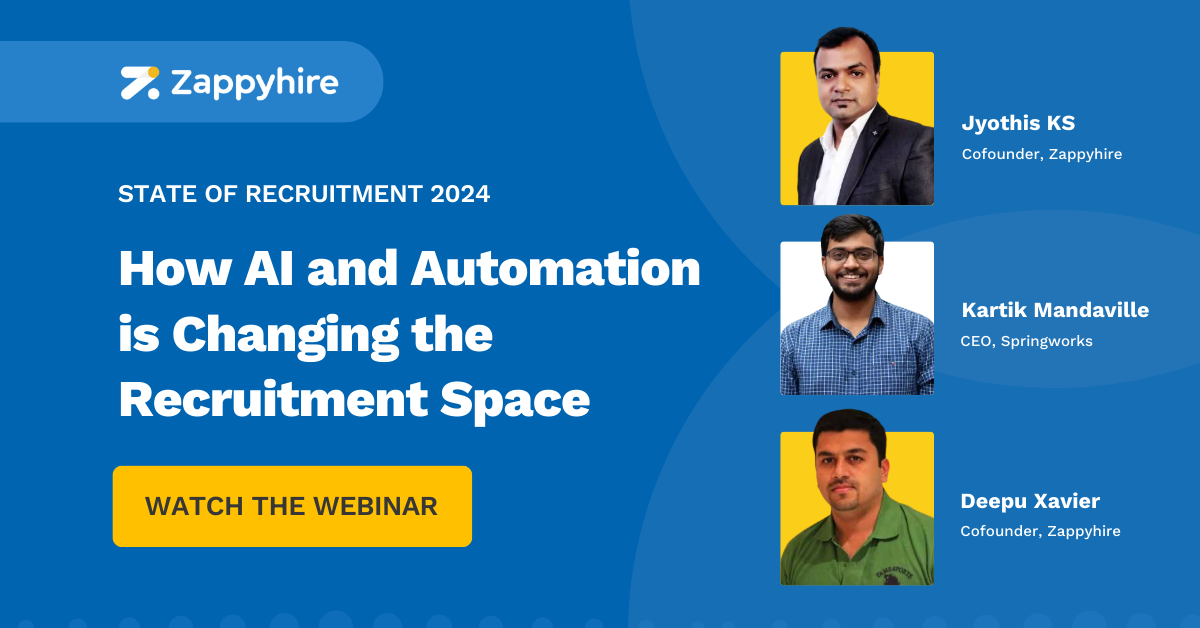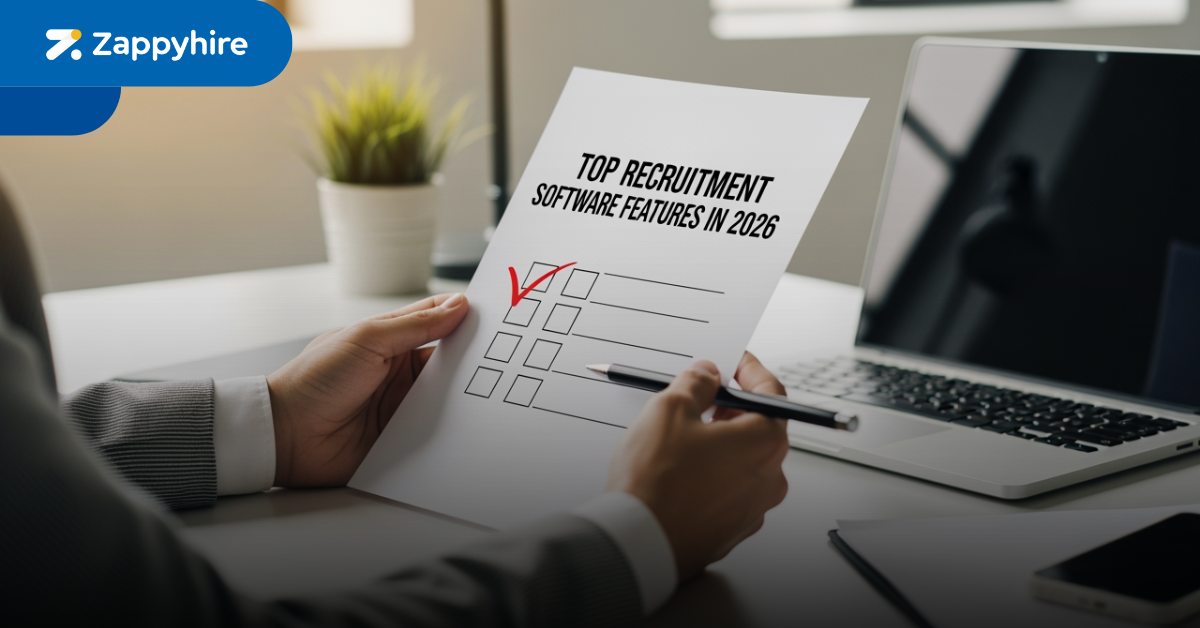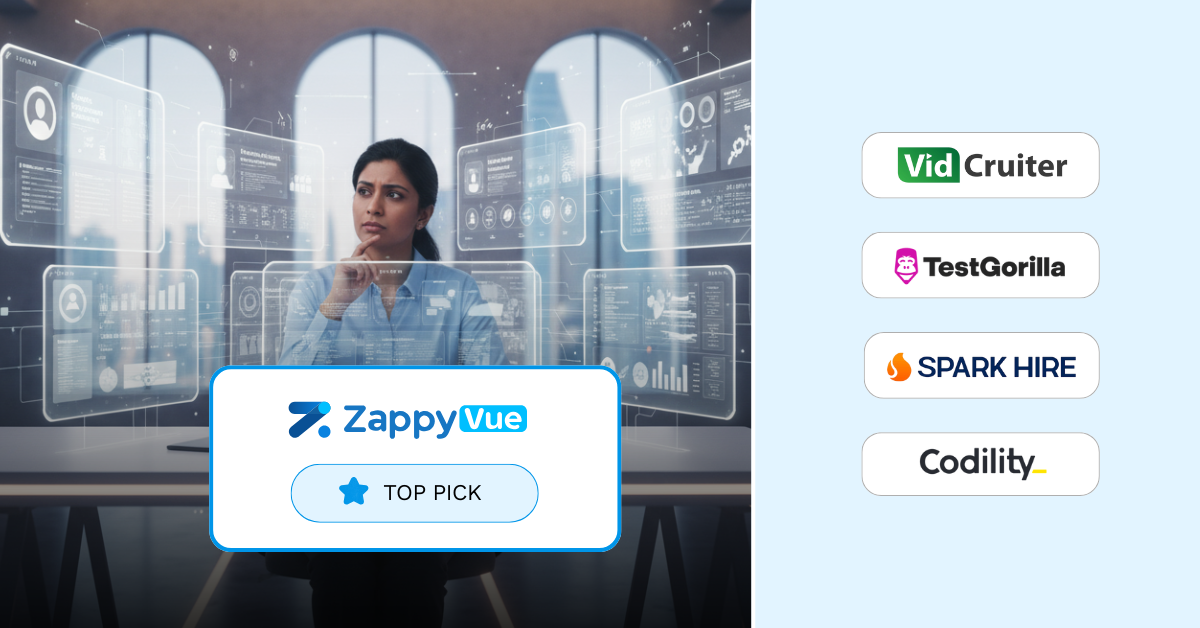
In our webinar, we broke down how AI and automation are reshaping recruitment in a way that’s easy to understand.
It was all about exploring how technology is making hiring smarter and more efficient.
Panelists Kartik Mandaville (CEO, Springworks), Jyothis KS, and Deepu Xavier (Co-founders of Zappyhire), discussed how AI and automation are changing recruitment, sharing practical tips to tackle everyday hiring struggles with automation.
AI as an enabler, not a decision-maker
The conversation began with a powerful statement from Jyothis KS, setting the stage for an insightful discussion on the role of AI in recruitment:
“We have identified around 16+ cases where we can potentially automate some tasks in the recruitment space. It’s not about AI as a decision-maker but more as an enabler.”
Jyothis KS, Co-founder of Zappyhire
With his trademark clarity, Jyothis highlighted that AI’s purpose is not to replace human recruiters but to empower them.
After all, AI enables recruiters to focus on more meaningful work rather than mundane scheduling or follow-up tasks.
One shining example of this empowering capability is ZappyVue, Zappyhire’s automated video interview tool designed for seamless candidate screening.
Speaking with enthusiasm about its impact, Jyothis shared,
“ZappyVue is catching on in the market because it asks skill-based questions to evaluate candidates effectively, eliminating much of the manual workload recruiters face.”
Opportunities for automation in the recruitment lifecycle
Recruitment involves multiple stages, each ripe for automation.
As Deepu Xavier remarked,
“Recruitment spans multiple stages, starting from manpower planning – when an opportunity is recorded in a CRM or ERP – and continuing through requisition, hiring, and offer generation. At every step, there’s an opportunity to bring in automation and intelligence to scale the process.”
Deepu Xavier, Co-founder of Zappyhire
Take, for example, predictive hiring. This advanced technology anticipates open positions, enabling HR teams to streamline manpower planning.
Speaking on the benefits of predictive hiring, Deepu Xavier, ever the visionary, shared that predictive hiring allows organizations to stay competitive by anticipating talent needs before they arise.
Another area ripe for transformation is interview scheduling.
With his signature enthusiasm, Deepu Xavier explained,
“Interview scheduling, often a messy and administrative process, can be automated to ensure the right interviewer, the right time slot, and no ghosting – improving the experience for both candidates and interviewers.”
Balancing recruitment automation and AI along with human touch
A recurring theme was the need to strike a balance between automation and empathy.
One thing became clear early on: AI isn’t here to take over recruitment. It’s here to help. As Jyothis KS said, “AI should work in harmony with human effort, maintaining a balance. There are places where AI cannot replace humans, as it isn’t yet at a level to show empathy.”
That balance is the key to making AI work for recruiters. AI can automate repetitive tasks and free up time, but it can’t handle situations where emotional intelligence is needed – like offering reassurance to candidates or understanding unique personal challenges.
Deepu Xavier summed it up perfectly:
“Technology can help you scale, but connecting with candidates requires empathy and emotional intelligence. That human touch is irreplaceable in talent acquisition.”
The ethics and apprehensions of implementing AI in recruitment
When it comes to AI in recruitment, there’s always a mix of excitement and concern.
For many organizations, concerns stem from three key areas: bias, data security, and job security.
Kartik Mandaville (CEO & Founder, Springworks) broke it down:
“From HR’s perspective, it’s about job security. For IT, it’s about data security – what happens, where is it used, and what biases might exist. For management, it’s the fear of missing out on potential talent.”
Kartik Mandaville
One of the biggest fears surrounding AI is bias.
As Deepu pointed out, “The problem isn’t with the algorithms themselves but with the data used to train them. For example, training an AI system on 10 years of biased hiring data will inevitably perpetuate those biases.”
Another critical concern is data privacy. Deepu explained, “Enterprises worry about confidentiality and the implications of their data being used beyond their control.”
Jyothis elaborated further: “The trend is moving toward hybrid systems where data resides within the organization, and AI logic operates in the cloud, maintaining data security.”
Scaling recruitment with AI while preserving empathy
AI can scale recruitment like never before, but it’s how you use it that makes all the difference.
Deepu explained,
“A hybrid approach works best – automate the top of the funnel to handle bulk candidates, but let human recruiters take over in the later stages to create meaningful, personalized engagement.”
This approach ensures recruiters aren’t bogged down by admin work. Instead, they can focus on what really matters: building relationships.
Jyothis made a good point: “Instead of spending time calling people and scheduling, recruiters can have a more strategic conversation with candidates, talking about the company culture. Sales and hiring are very similar – we need to sell the culture and make sure candidates are excited to join.”
Kartik Mandaville chimed in with another practical example – creating better job descriptions. “When a hiring manager says they want to hire a ‘growth marketer,’ the question arises: what does that even mean? Automation and insights can step in to align terms with real resumes, technologies, and industry standards.”
Final takeaway – AI as a recruiter’s ally
The webinar was a refreshing reminder that while technology can make recruitment faster and more efficient, it’s the balance between automation and empathy that leads to true success.
AI isn’t a threat – it’s a partner, helping recruiters focus on what they do best: building meaningful connections and driving great hires.






